Safari Season: The best time of year to plan your African safari adventure
Embarking on a luxury African safari is a transformative experience in any season. However, the time of year you choose to travel to our magnificent home continent—which is expansive, diverse and ever-changing—can greatly impact your journey and the wildlife you encounter.
While it’s tempting to plan your safari around the single “best time” to admire Africa’s awe-inspiring landscapes and wildlife in their full glory, it’s important to note that it is absolutely possible to go on a spectacular safari year-round—especially when accompanied by our experts who have lived and breathed the continent’s wilderness areas for their entire lives. The best time for a safari is also personal, ultimately depending on where you want to travel and your expectations for animal encounters, weather conditions and more.
Join us as we navigate the delicate dance of wildlife behavior, climate shifts and migration patterns to discern the best time for an African safari tailored specifically for you.
What factors influence the best time for an African safari?
Straddling the equator and comprising 20% of Earth’s land surface, Africa is, of course, incredibly climate diverse. Weather patterns change dramatically in each season, and wildlife follows suit, with animals displaying fascinating behaviors throughout all 12 months of the year. While it’s hard to go wrong when planning your safari with specialists like ROAR AFRICA, naturally you’ll want to familiarize yourself with each destination’s climate and how it might affect your opportunities for wildlife sightings and the experiences you have in mind.
Weather in Africa, explained
Wherever you travel in Africa with us, you can expect relatively warm temperatures for most of the year. What varies far more is rainfall and humidity. Most safari destinations have dry seasons and one or two rainy seasons. Rainy seasons are either short or long, which interestingly refers to the duration of the showers rather than the length of the season.
Rain or shine, Africa is breathtaking. However depending on what you most want to see, you should be aware of a general rule: Rainy season is ideal for travelers hoping for fewer crowds and the world’s best bird-watching, while dry season is the ideal time to venture out in search of animals as they gather in greater numbers at watering holes and begin to go forth on their instinctive migration patterns in search of greener pastures. And, of course, clearer skies and sunnier days generally make the dry season a more comfortable time for travelers, though witnessing cloud patterns, rain and the occasional storm work their way across vast savannahs is spectacular.
Animal sightings throughout the year
Whether you dream of trekking with mountain gorillas, photographing the iconic Big 5 or moving in time with the Great Migration, there is a soul-stirring safari for you. By getting acquainted with African animals’ migration patterns, mating seasons and birthing periods, you can time your safari for the best chance of witnessing these unforgettable natural phenomena.
The Great Migration—where close to 2 million wildebeest, as well as hundreds of thousands of zebras and antelope, depart from the dry savannahs of Tanzania in search of lush grazing pastures in Kenya—is the ultimate adventure in East Africa. Though the exact timing is impossible to predict, you’re most likely to see this incredible feat of nature begin in late May or June, when wildebeest start their thunderous trek across Serengeti National Park toward the Maasai Mara. This epic journey peaks between in July–October, when the wildebeest make dramatic (and sometimes unsuccessful) crossings of the Mara River where hungry crocodiles and other predators lie in wait.
Calving season is also an extraordinary time to go on safari in Tanzania, with newborn wildebeest making their debut in January–March, and newly awakened prides of lions and clans of hyenas prepare to hunt the calves. However, between varied mating seasons and complex feeding patterns, African wildlife puts on the show of a lifetime no matter the time of year. Simply tell our experts what interests you, let them work their magic to plan the safari of a lifetime for you and your loved ones and mark your calendar accordingly.
The best destinations and timing for your African safari
As we’ve learned, every African safari region has unique weather patterns, which is why it may be easiest to pick your destination before setting your dates. Fortunately, most national parks in Africa are open year-round, meaning your safari is never limited to any one season. The joy of safari lies in variation - one trip to Africa is never enough, this continent takes up permanent residence in your soul. We promise you’ll want to return and explore the continent’s top safari destinations over and over again, in every season.
East Africa: Kenya and Tanzania
- Best season overall: June–October
We feel the lure of East Africa—specifically Kenya’s Maasai Mara National Reserve and Tanzania’s Serengeti National Park—in its main dry season from June–October. This marks the height of the Great Migration, when wildebeest and zebra sightings are at their peak as they bound across vast savannahs and predator-laced rivers. The adrenaline one feels on these game drives is indescribable! Another dry season runs from January–February, a fantastic time to marvel at great prides of lions exercising their hunting skills during calving season. Vegetation is sparse during both dry seasons, making spotting and photographing wildlife a delight.
In the short rainy season from November to December, East Africa cools down, gradually turning emerald and becoming a paradise for bird watchers as migratory birds sporting beautiful breeding plumage arrive from other parts of Africa and Europe. This is the less disruptive of the two rainy seasons, with brief showers falling in the afternoons.
Showers may be frequent during the long rainy season of March-May, but this verdant period is also known as the green season, when the landscape transforms into a lush carpet of well-nourished flora. Crowds are lower this time of year, gifting guests an even more profound sense of peace and glorious seclusion. Not only will you find vibrantly-hued birds perched in the thriving trees, but you’ll also witness the circle of life as herds of young impalas and antelopes attract chasing predators.
Southern Africa: South Africa, Botswana, Zambia, Zimbabwe and Namibia
- Best season overall: May–September
South Africa’s dry season runs from May to September, and the rest of Southern Africa stays dry into October. This is a popular time for safari-goers hoping to glimpse giraffes, elephants and other wildlife as they gather at dams, rivers and waterholes, luring lions, and leopards and other predators in the process.
There’s no need to shy away from southern Africa’s rainy season, which starts in October or November and extends through April. Bird migration means beloved species abound in vivid colors with a lush backdrop of flourishing greenery. While wildlife may not be as concentrated, animal encounters are still very common—with the added benefit of minimal human crowds.
Planning your trip
Rest assured that whatever the weather brings, ROAR AFRICA’s expert team use their intimate knowledge of their home continent—gathered over 11 generations—to plan life-changing adventures for every guest. Our custom, year-round services guarantee that your busy schedule is never an obstacle, and your safari will unveil spectacular scenery and humbling animal encounters no matter where on the calendar it falls. For the best and widest variety of activities and accommodations, aim to book your safari a year or more in advance.
Embark on an extraordinary journey, carefully curated for a positive impact on the people, places and wildlife of our home continent, with ROAR AFRICA. To support the one-of-a-kind communities and wild spaces that remain, explore our luxury African safari destinations today or contact welcome@roarafrica.com




